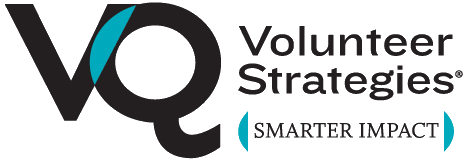Blog: The Power of Plans, Peers, and Pivots

At the start of 2020, we at VQ Volunteer Strategies were training and coaching four different cohorts of organizations. While each was designed to help organizations engage volunteers to deliver on mission, the focus of each cohort varied significantly, including one focused on building capacity of food pantries, another on engaging volunteers to deliver para-pastoral care, another with the goal of certifying organizations as Service Enterprise, and a fourth dedicated to piloting innovations in skills-based volunteering.
No surprise, due to the pandemic, the format, timeline, and expectations for each cohort dramatically shifted throughout the year. Like everyone else in this field, we were forced to pivot. First, we helped the teams redesign and refocus their work plans. Next, we extended deadlines, adjusted training topics, and, of course, recalibrated our expectations.
As we wrap up all four of these cohort-based engagement initiatives as 2020 ends, we were a bit unsure of what outcomes to realistically expect, given all the challenges posed by the Coronavirus pandemic. Yet, the post-initiative surveys and the first-hand accounts reported during year-end convenings, we have been delightfully impressed by all that the participating teams have achieved. Why were they successful even amid one of the most challenging years in nonprofit history? We thought it would be helpful to look at what the successful organizations all shared so that we might be able to apply those lessons more broadly to our sector’s work in 2021 and to our personal work plans.
Here are three themes that reverberated across all the participating organizations who demonstrated great outcomes despite 2020’s challenges:
- Accountability – Our initiatives launched with training and the design of a work plan. with a clear vision statement, intended outcomes, actions, and a timeline, work plans established accountability early on. Accountability was also built into the regularly scheduled coaching calls. Most teams report that having time set aside to work on implementing new volunteer roles and expectations of reporting progress were key to sustaining momentum even amid this challenging year.
- Partnership – Many teams also noted that truly partnering with volunteers was key to their success. Finding the right volunteer to lead projects or take on new work was vital to delegating tasks and truly building capacity, especially when staff roles were rewritten amid the pandemic. Even as initial plans had to change – such as the summer camp whose initial plans involved on-site volunteer service days – most teams engaged volunteers to do work virtually which required a level of autonomy beyond that of traditional in-person volunteering. They also noted the value of being in a cohort of peers from whom they could learn and gain inspiration.
- Spirit of Innovation – All of these initiatives were built on the premise that engaging volunteers brings in new talent, new ideas, and resources and thereby can increase an organization’s adaptability even during challenging times. This year, the premise was certainly tested – and participating organizations reported that the encouragement to creatively adapt to these challenges, the tools and templates designed to support innovation, and the understanding that many volunteers are interested in partnering in problem-solving were what made the difference. They may not have viewed volunteers as a solution to these challenges and instead may have succumbed to the temptation to just put volunteer engagement on hold until life returned to some semblance of “normal.” Instead, they engaged volunteers to help them adapt.
As one participant reported:
[This] program has equipped me with extensive knowledge and resources that have been integral to my success ESPECIALLY during this crazy pandemic. Most of our volunteer efforts have been temporarily suspended this year, and most of my … teammates had to shift their focus to other [organizational] operations. So, if it weren’t for the training and coaching we received, I could have easily lost track of developing any of the important outcomes that we still managed to accomplish.
As we move into 2021, how can you embrace these lessons into your work? Here are a few thoughts to guide your response.
Accountability – What types of accountability resonate for you and how can you build that in to your plans? Develop a volunteer engagement plan for your organization and hold yourself to it. Engage a mentor or an accountability partner to meet and share progress regularly.
Partnership – What partnerships would help you adapt and move forward in this new reality as your organization reopens and/or re-engages volunteers? What volunteer partner roles could help you implement new protocols, adapt trainings to online, check in with volunteers, analyze data around impacts of the re-engineered engagement amid the pandemic? How will you leverage partnerships with volunteer centers, businesses, and others to recruit qualified volunteers?
Spirit of Innovation – Where have you piloted new roles this year and how are you reporting on the impacts to leadership and others? What new volunteer roles can you develop to sustain your mission-critical work?
